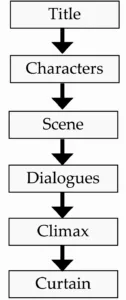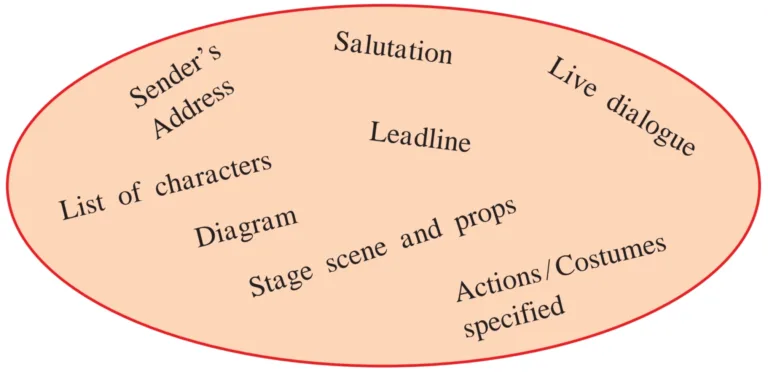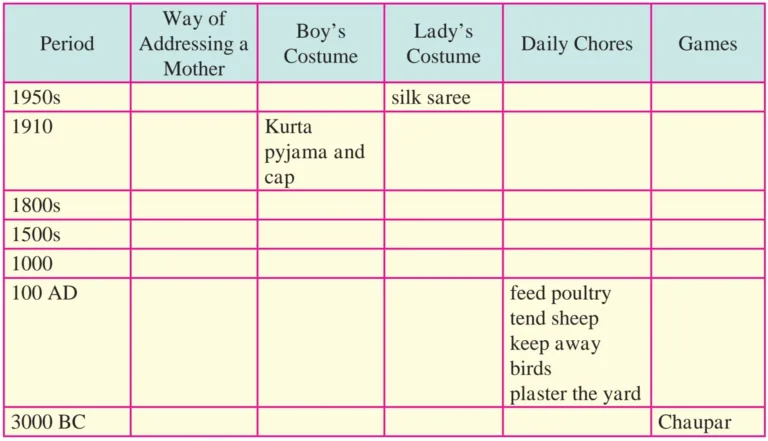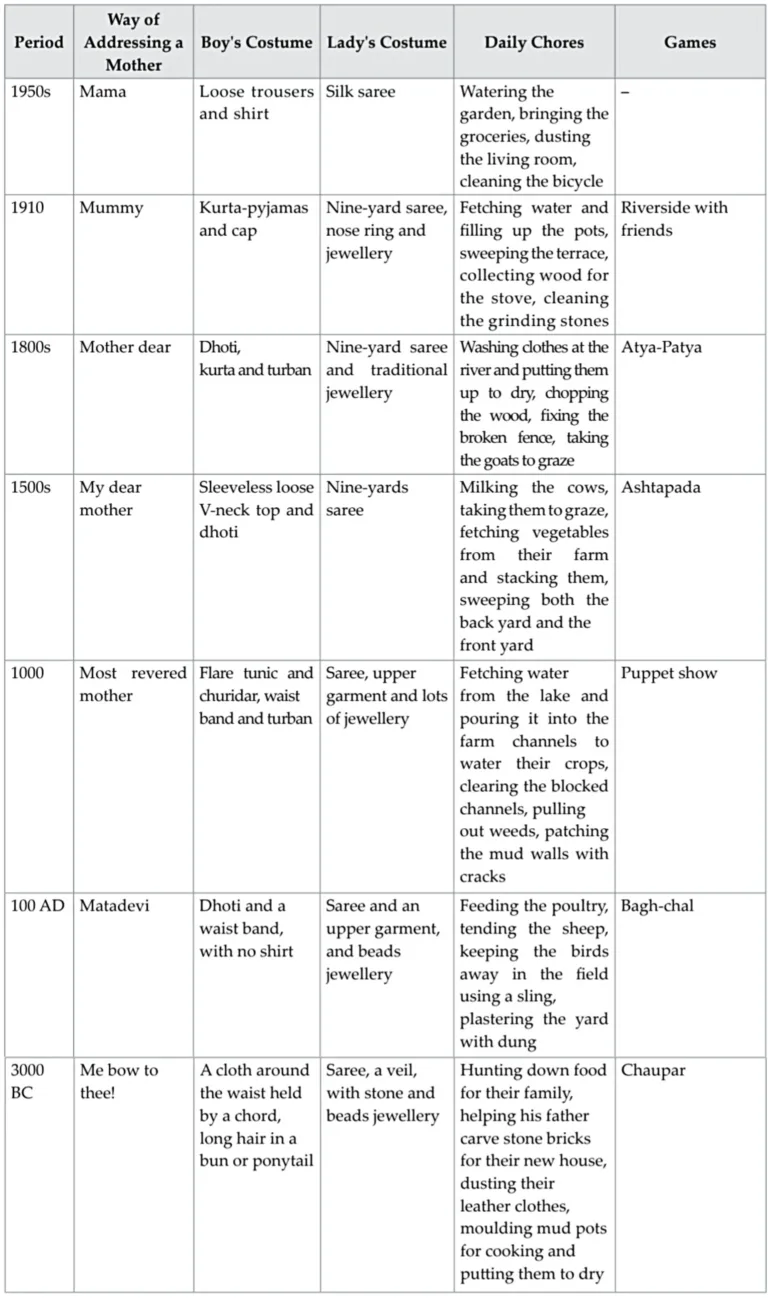Chapter 2.6 – The Past in the Present
Neel is asked by his mother to clean his room and make his bed. He is reluctant to do this and tries giving excuses to avoid doing the tasks. Then his mother tells him about his grandfather in a similar situation. His grandfather’s mother would also tell him to clean his room. When his grandfather gave excuses, his mother told him about his grandfather. This starts a chain of Neel’s ancestors from the 1950s to the 1500s to the 100 AD to finally 3000 BC. These stories end the same way as the mothers tell their sons to do their daily chores. The lesson isn’t just the fulfillment of tasks, but also the importance of a routine. No matter how much work we do, this gives us self-control and determination.
∗ ∗ ∗ Warming up! ∗ ∗ ∗
Components of a Play
1. We find the following in the script of a skit or play. Rearrange these steps in the proper order and write them down in the form of a flow chart.

Ans:

2. Think of a play/skit which you have seen enacted on the stage and which has impressed you. Write the following details about it.
Name of the play/skit :
Ans: Macbeth
Important characters :
Ans: Lord and Lady Macbeth, the three witches, Lord Macduff, Lord Banquo, King Duncan and his son Malcolm.
Any famous actors/actresses :
Ans: Ian McKellen, Judi Dench
Theme :
Ans: Ambition leading to one’s end, as Macbeth murders King Duncan to become king
Climax :
Ans: Macduff defeating Macbeth in battle and killing him
Ending :
Ans: Malcolm, taking his father King Duncan’s place as the rightful ruler
Use of lights and special effects if any :
Ans: Smoke and fog when Macbeth meets the witches, the witches disappearing, lightning, the forest of Birnam wood travelling to Dunsinane Hill
Use of background music and sound effects if any :
Ans: Storms with thunder and rain, sounds of the battle
Use of sets :
Ans: The castles of Forres, Inverness and Dunsinane Hill
The costumes, make up, etc. of the characters :
Ans: Clothes from 9th Century Scotland, the witches’ ugly looks, Banquo’s ghost
How well the actors present the play and behave on the stage :
Ans: Macbeth feels like a real story happening right in front of us and not just a drama, as the actors live their roles and don’t just play their characters.
Your own opinion about the play :
Ans: Macbeth is a classic Shakespearean tragedy that always was and will be appreciated as it can be relatable and understood by every person in an audience even after 500 years of its creation
3. Present these points in the form of a review, and give it a suitable title.
Ans:
Rise and fall: Macbeth’s Ambition
Macbeth is a tragic drama written by the great Shakespeare that still appeals to people after 500 years. It is inspired by real historical events in Scotland during the 9th Century. The main characters are Lord and Lady Macbeth, the three witches, Lord Macduff, Lord Banquo, King Duncan and his son Malcolm. One of the best stage adaptations of this play had Ian McKellen and Judi Dench playing the roles of Lord and Lady Macbeth. It felt less like a drama and more like the story was taking place in front of us. All the actors seemed to be the people they were playing. The detailed costumes, elaborate sets and immersive sound and visual effects added to their theatrical skills. The castles of Forres, Inverness and Dunsinane Hill, as well as Birnam Wood, all felt like live locations. The theme of merciless ambition leading to one’s eventual fall is something that we can all relate to. The play reaches its peak in the final battle where Macbeth meets his end at the hands of Macduff. The end is happy as the rightful heir to the throne Malcolm promises his people to be a good king.
4. Prepare a ‘PowerPoint’ presentation, using one slide for each of the above points. Present your review in a PPT format in the classroom.
Ans: Students should do this on their own.
∗ ∗ ∗ ENGLISH WORKSHOP ∗ ∗ ∗
1. In the diagram below encircle the various features that make the script of a skit / play. List the other words and mention the form of writing of which it is a feature.

Ans: Leadline is a feature of a News Report. Salutation and Sender’s Address are features of a Letter. Diagram is a feature of Information Transfer.
2. Choose the proper alternative to complete the following.
(i) The skit covers a period of about in the past.
(a) 3000 years
(b) 1000 years
(c) 5000 years
(d) 1800 years
Ans: (c) 5000 years
(ii) characters from Neel’s ancestral lineage make an appearance in the play.
(a) Fourteen
(b) Seven
(c) Sixteen
(d) Twelve
Ans: (b) Seven
(iii) The task that all boys abhorred was
(a) cleaning up their room
(b) farm-work
(c) filling up water
(d) making their beds
Ans: (d) making their beds
(iv) The skit conveys that doing your daily chores at home
(a) makes you stronger
(b) sharpens your intellect
(c) saves a lot of expenses
(d) inculcates a sense of responsibility
Ans: (d) inculcates a sense of responsibility
3. Fill in the table.

Ans:

4. Answer in your own words.
(a) What excuses did Neel give to avoid cleaning his room?
Ans: To avoid his chores, Neel gives the excuse that he had just cleaned his room two days before. He also says that his bed will get messed up when he rests after lunch, so why should he make it.
(b) Why does mother tell Neel about his Grandpa?
Ans: Neel’s mother tells him about his Grandpa to show him that his Grandpa had many more difficult tasks to do, both inside and outside the house. She wants him to know that his life is easier.
(c) What task did Grandpa wish to avoid?
Ans: Neel’s Grandpa, like him, wished to avoid making his bed after all the chores that he had done.
(d) What did the ancestor from 1910 wish to do instead of making his bed?
Ans: The ancestor from 1910, Neel’s great great grandfather, wished to go to the riverside to play with his friends instead of making his bed.
(e) How many chores did the ancestor from 1800 have to do?
Ans: The ancestors from 1800 had to wash clothes at the river and put them up to dry, chop the wood, fix the broken fence and take the goats to graze.
(f) How is the boy from the 1500s dressed?
Ans: The boy from the 1500s is dressed in a sleeveless loose V-neck top and a dhoti.
(g) What chores did the boys from 1000 CE and 1st Century CE do on their farms / fields?.
Ans: The boy from 1000 CE had to fetch water from the lake, pour it into the farm channels to water their crops, clear the blocked channels and pull out weeds. The boy from 1st Century CE had to feed the poultry, tend the sheep and keep the birds away in the field using a sling.
(h) What did Neel realise from his encounter with his ancestors?
Ans: After meeting his ancestors, Neel realised that his ancestors had a life with more hard work and that his life was much easier compared to theirs. They would have to do household work and help their family with other tasks instead of just their daily chores.
5. In the play two devices that make use of wheels are given.
The devices are
Ans:
(1) Bicycle
(2) Grinding stones
From the internet or other sources, trace the history of the use of the wheel. Write ‘An Autobiography of a Wheel’.
Ans:
‘An Autobiography of a Wheel’.
I am a wheel, and this is my story. My journey began thousands of years ago in ancient Mesopotamia, around 3500 BCE. At first, I was just a simple wooden disk, but humans soon realized my potential.
In those early days, I rolled alongside carts and chariots, making transportation easier. As time passed, I evolved, with various civilizations using me for different purposes. The Egyptians employed me in pottery, while the Greeks harnessed my power for milling grain.
The Romans integrated me into their daily lives, enabling smoother travel across their vast empire. I played a vital role in the Industrial Revolution, transforming factories and machines. Eventually, I became an essential part of automobiles, revolutionizing personal transportation.
Today, I continue to spin my way into various aspects of modern life, from bicycles to airplanes. My journey has been one of evolution and adaptation, from a simple wooden disc to the complex, versatile device I am today. I’ve seen the world change, and I’ve changed with it, remaining a symbol of human innovation and progress.
6. Imagine that the ancestor from 1910 (AD) visits Neel in his dream. Compose a dialogue between the two about the various gadgets the visitor sees in Neel’s room.
Ans:
(Neel is sleeping peacefully and his ancestor Pratap from 1910 visits him in his dream)
Pratap: Hello, Neel, my name is Pratap. Do you know who I am?
Neel: Pratap was my great great grandfather’s name. I hope I remember correctly.
Pratap: Yes, you’re right. I’m indeed your great great grandfather. I wanted to see how you were doing. As far as I can see, you don’t like cleaning your room anymore than I did.
Neel: I’m doing good, and yes, Mom has been asking me to clean my room all day today. I don’t like doing it because nobody enters my room beside me. But now that you’ve come to see me, I’ll tidy it up as fast as I can.
Pratap: You’re a good boy, Neel. You’re more obedient than I ever was. But what are all these objects in your hands?
Neel: They’re just my gadgets. Would you like to see them?
Pratap: I have never seen anything like these, tell me more. What are these round things?
Neel: These are called headphones. We use them to listen to music anywhere we want.
Pratap: Wow, we only had a gramophone to listen to music when I was your age.
Neel: That’s exactly what these are, small gramophones that you can take along with you.
Pratap: And what’s this small block they’re connected to?
Neel: It’s called a mobile phone. It’s just like a telephone, but you can also take it with you.
Pratap: It looks more complicated than that. What else does it do?
Neel: You can also take pictures, play the radio, set an alarm, and even watch movies.
Pratap: This little block does all this? No wonder your generation is so smart.
Neel: I wish you had all these gadgets in your time too, Grandpa.
Pratap: We don’t need these objects to have fun. Our times were simpler and much easier. But promise me one thing, Neel. Never let such objects take control of your life. Happiness comes from inside you, not from things outside. It comes from the people you love around you.
Neel: I promise, Grandpa. I will always treasure my loved ones more than material things.
Pratap: That is all I had to tell you, son. I will go back now. Be a good boy. You have my blessings.
Neel: Thank you so much, Grandpa. I will always remember your advice and keep my word.
7. Imagine and compare an argumentative dialogue between the mothers of the 20th / 21st century and those of the earlier era, about which life was better for women.
Ans:
Neel’s mom: I love working as a manager in my office, even though it can be tiring. My only concern is that I can’t spend time with Neel and give him my attention.
Ashok’s mom (1950s): I love my job too, but I’m not treated equally like the men in my office. However I can look after the kids and give them at least some time every day.
Madhav’s mom (1800s): The only work I know is household chores and other odd jobs. I wish I could have been able to study. But I’m able to make sure my children get enough care and comfort.
Uruk’s mom (3000 BCE): I enjoy gathering and hunting with my family. But I want to spend more time doing what I love.
Neel’s mom: At least I can give him a comfortable life where he gets what he wants. Well, everything except a loving mother.
Ashok’s mom: I try to give whatever he needs, he works hard for himself to get whatever he wants.
Madhav’s mom: I’m unable to give him anything myself, even knowledge. But I can provide all the warmth and love of a mother.
Uruk’s mom: He hunted from when he was a kid. I wish I was able to do more for him, so he wouldn’t have to.
Madhav’s mom: Isn’t there any era where women are happy doing what they are able to?
Ashok’s mom: Yes, why do we always want to keep doing more? Even when we’re doing so much?
Neel’s mom: Maybe that’s what makes us good mothers and better people. We never stop trying to better ourselves. It’s not only for our own sake, but even for our children’s happiness.
Uruk’s mom: I think you are right. Mothers want to do as much as they can. And even more of what they can’t.
Neel’s mom: We don’t feel this because we don’t do enough. We feel this because what we want to do is never ending. We should just be happy doing what we are able to, to the best of our capacities.
8. Read the entry about ‘voice’ in the ‘Language Study’ pages. Note that the speeches of all the boys are in the ‘active’ voice. Turn them into passive constructions.
Example :
Neel –
I put the dishes in the dishwasher. (active)
Dishes have been put in the dishwasher. (passive)
1950s Boy –
I have watered the garden
Ans: The garden has been watered by me.
brought home the groceries
Ans: The groceries have been brought home by me.
dusted the living room
Ans: The living room has been dusted by me.
cleaned my bicycle…
Ans: My bicycle has been cleaned by me
9. Think of suitable names for the boys from the earlier centuries.
Ans:
(i) 1950s Ashok
(ii) 1910 Pratap
(iii) 1800s Madhav
(iv) 1500s Malhar
(v) 1000 Ramanath
(vi) 100 CE Krishnadeva
(vii) 3000 BCE Uruk
10. Form groups of 5-8. Translate the play into your mother tongue (or Hindi) as a group activity. Enact the translation in the classroom.
Ans: Students should do this on their own.
11. Read ‘The Story of the Amulet’ by E. Nesbit.
Ans: Students should do this on their own.
